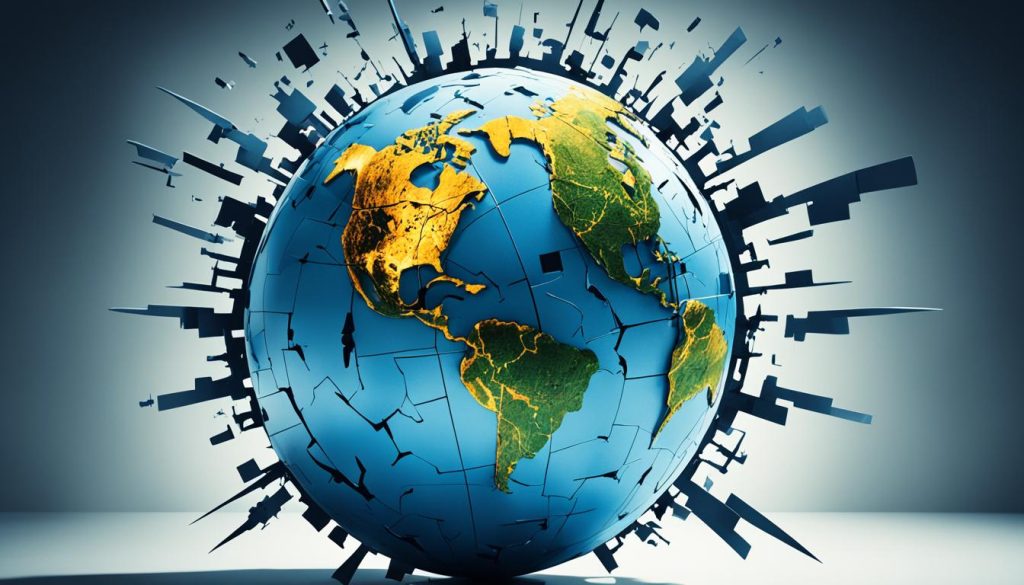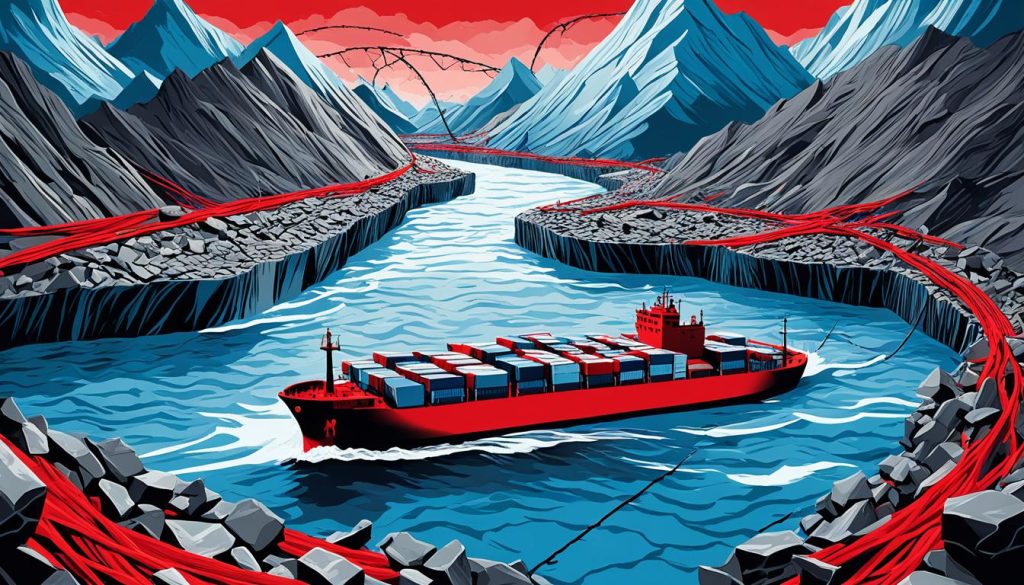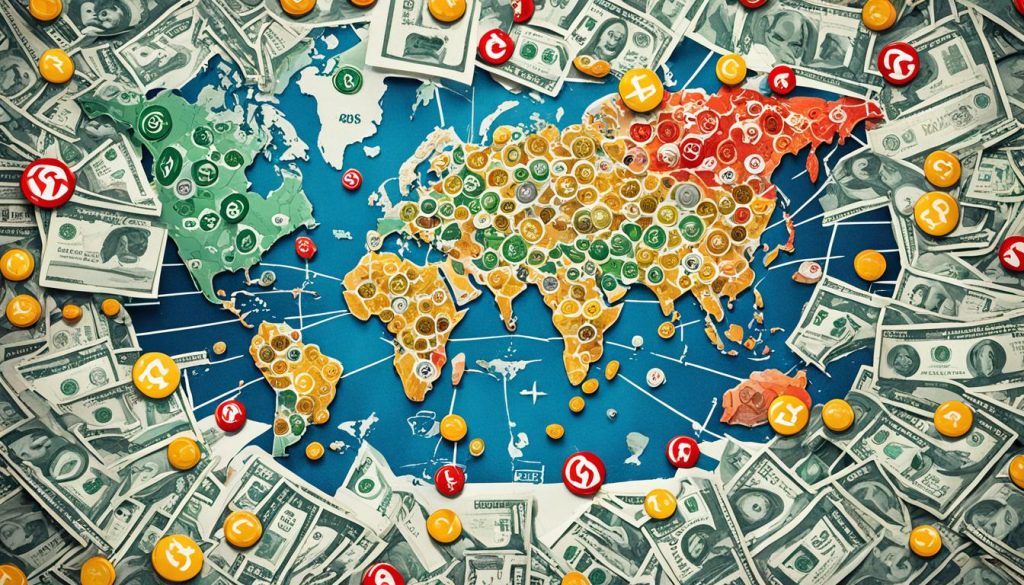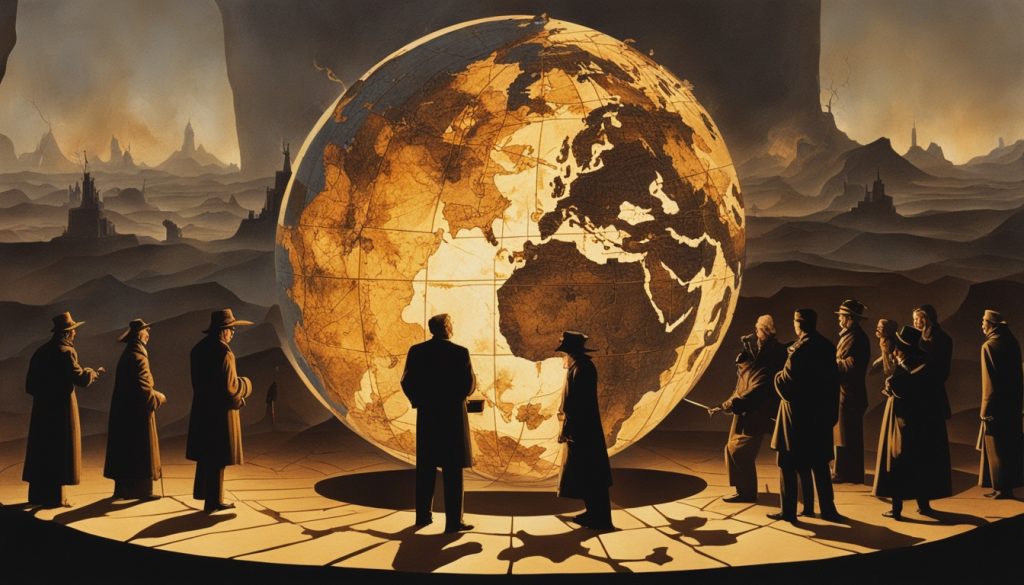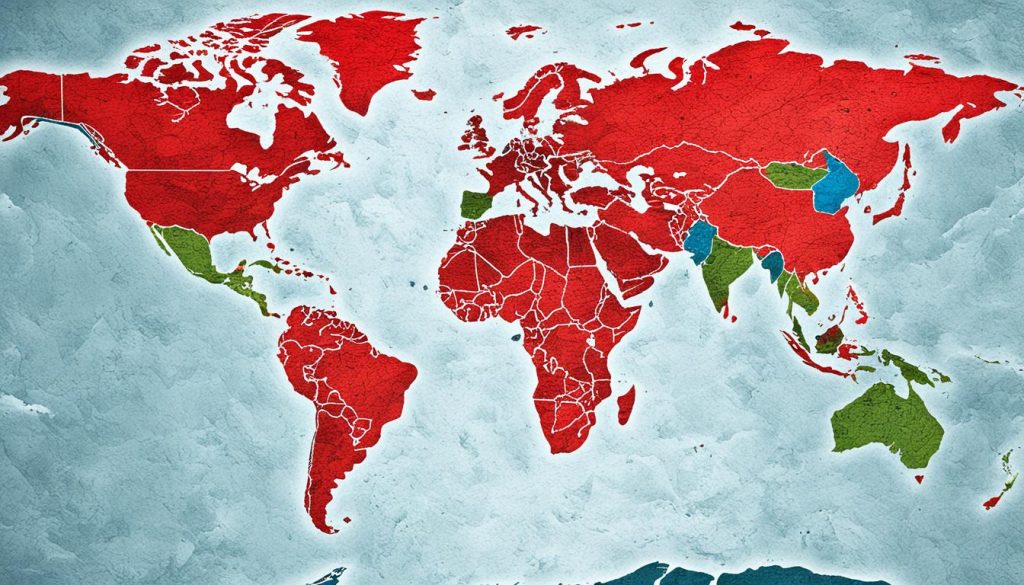Today’s world is tightly connected, making geopolitical uncertainty a key factor for international business strategies. The ongoing war in Ukraine and conflicts in the Middle East show how these risks affect the global economy. Businesses everywhere need to deal with political events, conflict, and military tensions. These factors greatly impact their operations and financial health across the globe.
The path of the global economy is deeply influenced by political decisions within countries. Governments implement fiscal policies that stimulate or slow down economic growth. This affects businesses both at home and abroad. Thus, it’s vital to understand and reduce geopolitical risks in today’s unpredictable world.
Key Takeaways
- Geopolitical risks profoundly influence international business operations and global economic performance.
- Events like the war in Ukraine and Middle East conflicts exemplify the impact of geopolitical uncertainty.
- Companies must adapt their business strategies to account for political events, conflicts, and military tension.
- Internal political affairs and government fiscal policies shape economic activity and impact global trade.
- Mitigating geopolitical risks is crucial for maintaining operational and financial stability across borders.
Understanding Geopolitical Risks
Geopolitical risks are a major concern for global businesses. They range from local upsets to worldwide emergencies. These risks can change how companies work across the world.
Definition and Scope
Geopolitical risks cover many issues like political instability, military conflicts, and terrorist threats. They can shake the global economy, affecting markets, trade, and prices. Knowing about these risks helps in making strong business plans.
Examples of Geopolitical Events
Recent events show how crucial it is to manage geopolitical risks. The Ukraine conflict demonstrates how military conflicts disrupt economies. Political instability in places like the Middle East impacts global energy. Also, terrorist threats lead to higher costs and challenges for companies.
How the War in Ukraine Affects International Trade
The war in Ukraine greatly affects global trade. It shows us how conflict can interrupt the flow of goods worldwide. As geopolitical tension rises, trade is getting hit hard. This affects many sectors.
Impact on Supply Chains
One big effect of the war is blocked supply chains. Many industries depend on goods from Ukraine and Russia, like food and energy. With the tension growing, this leads to big delays and problems in making products all over the world.
Economic Sanctions and Their Repercussions
Western countries have put sanctions on Russia. They aim to punish Russia, but this also messes up global trade. These sanctions hurt many industries, causing shortages and making prices go up. Also, the tension makes the global market unpredictable. This affects how investors feel and the economy’s health.
This situation combines trade problems, the effects of sanctions, and growing tension. It’s a big challenge for businesses around the world. They need to find new ways to handle these risks and keep trading overseas.
Geopolitical Impact of the Middle East Conflicts
Tensions in the Middle East affect businesses around the world. They deal with oil supply issues and higher shipping insurance. These problems change how global trade works.
Disruption of Oil Supplies
The Middle East conflicts, like the Israel-Hamas fight, disrupt oil supplies. This region has lots of the world’s oil. Any fight there hits oil production hard, making prices go up.
Increased Insurance Costs for Shipping
Risks in the Middle East have raised shipping insurance costs. Ships passing through these waters pay more for insurance now. This makes goods more expensive and can lead to higher prices everywhere. Companies have to include these extra costs in their budgets.
These problems show how global economy connects with political issues. It’s important for businesses worldwide to understand this and prepare.
The Role of Elections in Shaping Geopolitical Risks
In our connected world, elections in various countries have a big role in geopolitical risks. They shape trade and investment policies, affecting the global scene directly.
Significant Upcoming Elections
Many countries are gearing up for important elections. Places like the United States, India, and countries in the European Union are among them. These elections might shift global policies, especially in trade and economics, changing how businesses plan on a large scale.
Political Uncertainty and Business Strategy
Elections create political uncertainty, making businesses rethink their plans. They may have to change how they enter markets or invest. This leads to cautiousness in their strategies, impacting decision-making in many industries.
Financial Market Volatility Due to Geopolitical Risks
Geopolitical risks can shake the financial world. They create a volatile situation for investors and markets. When there is more uncertainty, controls on money and sanctions can make prices swing a lot. Risk premia also go up a lot.
Capital Controls and Financial Sanctions
As tensions between countries rise, governments may set up controls on money and sanctions. These actions, though needed, add to the volatility in financial markets. They cause big changes in asset prices. Often, investors are surprised, leading to big ups and downs in prices.
Asset Price Surges and Risk Premia
The state of the economy is closely tied to geopolitical peace. When risks grow, investors want more return for the increased risk. This leads to big jumps in asset prices. These changes show the need for higher returns to make up for the risk. As a result, market volatility gets worse, making things trickier for businesses and investors.
Trade Restrictions and Commodity Price Effects
Geopolitical tensions often cause trade limits. These limits greatly affect international trade and commodity prices. They change how global business works, bringing big challenges for everyone around the world.
Supply Chain Disruptions
Trade barriers mess up supply chains first. They stop goods from moving freely, causing delays and higher costs. This makes businesses less efficient and competitive globally.
Shortages of Key Resources
Trade limits can cause big shortages in important goods like oil and raw materials. This makes prices go up. Both industries and consumers feel the impact of these political moves.
Inflation and Economic Growth During Geopolitical Tensions
Geopolitical tensions often lead to economic challenges, like higher inflation and slower growth. These tensions disrupt global trade, making supply chains harder to manage. This pushes up the prices of goods.
Factors Driving Inflation
In times of instability, the cost of raw materials and energy rises. Disrupted supply chains cause delays and scarcity, raising prices. Companies also spend more on security, passing extra costs to consumers.
Lower Growth and Welfare Losses
Geopolitical tensions slow down economic growth. Businesses, facing higher costs and uncertainty, reduce investments. This leads to slower growth.
People end up with less money to spend, lowering their living standards. It’s clear that stability is key for economic growth and better living conditions. While businesses try to cope, governments and policymakers must help lessen the impact of these tensions.
Domestic Political Instability and Its Global Effects
Political instability in a country can send shockwaves through the global economy. It affects markets and shapes fiscal policies. Such turbulence leads to uncertainty, shaking investor confidence and economic activities everywhere. This, in turn, causes global markets to be volatile as they respond to unpredictable policy decisions.
Governments’ Fiscal Policies
When countries face political instability, it’s hard to ignore how it affects government policies on spending and taxes. Uncertainty about who is in charge and the policies they will follow leads to inconsistent fiscal decisions. These decisions impact national economies and how countries trade with each other. For example, sudden tax changes or shifts in government spending can upset business operations, affecting global markets greatly.
Moreover, unstable politics may push governments to adopt short-term policies aimed at quick economic fixes rather than long-term growth. This can cause currencies to fluctuate, borrowing costs to rise, and trade agreements to change. International companies have to stay flexible to deal with these changing conditions. They need to manage risks and grab new opportunities in a complex global market.
The Rise of Populism and Its Economic Impact
Populist movements have grown a lot lately, changing politics around the world. These groups often focus on national pride and doubt about globalisation. They support ideas that might harm the economy. For example, they like trade protectionism. This means they want to protect local businesses from overseas competition. But, this can lead to less international trade and working together.
Populism’s effect on the economy is big. Countries with populist policies often see markets going up and down a lot. This is because investors are nervous about sudden changes in rules. Populist leaders may choose quick wins over steady, long-term plans. This choice can increase public spending too much. Then, the country’s debt goes up and investors feel less sure about putting their money there.
Trade protectionism, a key idea of populists, usually backfires. At first, it aims to save jobs and factories at home. But later, it may cause trade fights with other countries. These fights can mess up the world’s business operations. They harm economic steadiness, slow down new ideas, and growth too.
- Populist movements often shake up usual global teamwork.
- Economic steadiness is at risk because of populist ideas.
- Trade protectionism can cause worldwide business problems and even trade battles.
It’s important to understand populism and what it brings. This knowledge helps businesses and policy makers. They learn about possible dangers and ways to deal with a rocky economic scene caused by populism. Knowing all this lets them make plans to lower risks. They can keep the economy stable in a world that’s leaning more towards populist views.
The Geopolitical Risk Index: A Tool for Business
The Geopolitical Risk Index (GPR) helps businesses understand global political events better. It uses the frequency of newspaper articles about geopolitical risks. This creates a way to measure how these events affect international business.
It’s important to grasp how the GPR works. This ensures you can correctly interpret what it shows.
How the Index is Constructed
The GPR comes from thorough research. It counts mentions of geopolitical events in major newspapers around the world. This method offers a wide view of geopolitical issues.
By counting terms related to conflicts, diplomatic strains, and military actions, the index measures risk levels over time. This helps businesses plan their strategies in an ever-changing world.
Limitations of the Index
However, the Geopolitical Risk Index isn’t perfect. It can’t predict the future. It only shows what’s happening now or what has already happened.
It’s also hard for the GPR to tell the difference between kinds and sizes of risks. This can make it tough for businesses to respond correctly to specific threats. Moreover, the index might not show all aspects of geopolitical issues. So, ongoing research is vital to keep improving the index.
Critical Geopolitical Risks in 2024
By 2024, everyone should be ready for big changes in world politics that could affect markets. There are old conflicts and possible new problems worldwide. These issues could impact economies, trade, and peace between countries.
Existing Conflicts and New Tensions
Conflicts like the ongoing war between Russia and Ukraine are major risks. The Middle East could also face new challenges. These areas can see quick escalations, causing big disruptions.
The Impact on Global Markets
These tensions affect all global markets. They can cause big swings in the prices of oil and gas. They might also make the cost of everyday goods go up. This can shake economies.
Those shifts can disturb stock markets, mess with currencies, and complicate how goods are moved around the world.
It’s very important to keep up with these issues. Being ready for them in 2024 will help businesses stay strong.
Geopolitical Risks from Cybercrime
In this digital era, geopolitical risks go beyond the old conflicts. They now involve cybercrime. Businesses everywhere face cyber threats that could hurt them operationally and financially. This makes strong cyber protection vital.
Targets and Threats in the Digital Age
Cybercrimes against businesses can range from complex frauds to attacks on vital systems. These can interrupt day-to-day operations and leak important data. This may lead to huge financial losses and harm reputations. Finance, healthcare, and energy sectors are often targeted. This shows how wide and serious these threats are.
There’s a pressing need for solid security practices.
Protective Measures for Businesses
Businesses must fight digital threats with effective cyber protection measures. This includes using top-notch encryption, keeping software up-to-date, and doing regular security checks. Training staff to spot phishing scams is also crucial. With these actions, businesses can defend their assets well. They’ll also stay strong amidst the digital world’s risks.

